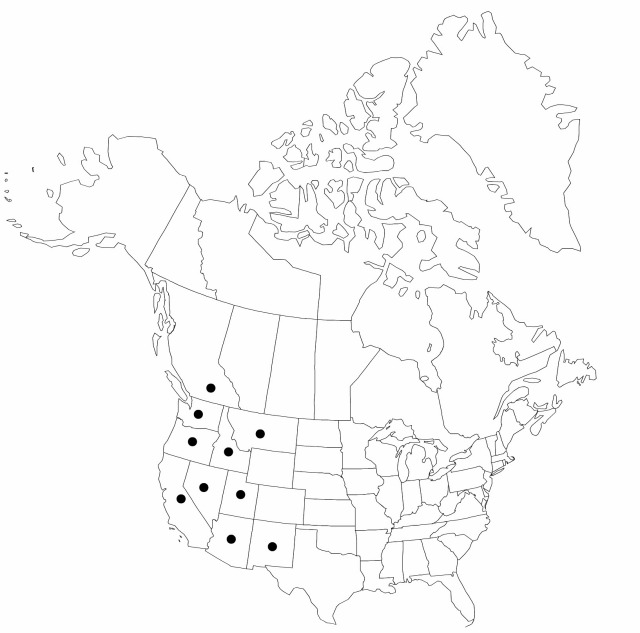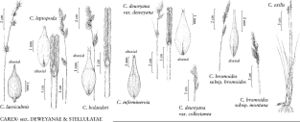Carex bolanderi
Proc. Amer. Acad. Arts 7: 393. 1868.
Plants densely to loosely cespitose. Culms 31–115 cm × 0.9–2 mm, smooth, serrulate, or scabriduous at mid height. Leaves: ligule of distal leaf (2–)3.5–7.1 mm, 2–3.9 times as long as wide; blades 1.8–5.9 mm wide, widest blade 2.3–5.9 mm wide. Inflorescences (33–)40–89(–103) mm; proximal internode 6–32 mm; proximal bracts 14–43 mm, awn 10–39 mm; spikes 5–9, usually gynecandrous; proximal spikes usually with 1–4 staminate and (14–)18–31(–40) pistillate flowers, 12–22(–25) × 3.9–6.5 mm; terminal spikes usually with 1–5 staminate and 14–28 pistillate flowers, 9.6–16 × 3.4–6.2 mm. Pistillate scales with whitish to castaneous margins, (2.2–)2.5–4.1 × 1.4–2 mm, body 2.2–2.9(–3.1) mm, apex acuminate to short-awned to 1.5 mm. Staminate scales with whitish to castaneous margins, 3.1–4.3 × 1–1.5 mm, apex acute to short-awned. Anthers 1.3–1.8 mm. Perigynia erect to appressed-erect, green to brown, prominently to weakly 3–7-veined abaxially, prominently to weakly 0–3(–6)-veined adaxially, narrowly lanceolate, 3.4–5.2 × 1.1–1.4 mm, 2.9–4 times as long as wide, apex abruptly contracted to gradually tapering; beak 1.5–2.5 mm, 0.4–0.53 times as long as perigynia, margins serrulate, apex bidentulate, teeth (0.2–)0.3–1 mm, (0.06–)0.09–0.2 times as long as perigynia. Stigmas 1.8–2.5 mm. Achenes 1.5–2.1 × 0.9–1.3 mm, 1.3–1.8 times as long as wide.
Phenology: Fruiting spring–summer.
Habitat: Mesic to wet forests, forest edges, especially near streams
Elevation: 30–2500 m
Distribution

B.C., Ariz., Calif., Idaho, Mont., Nev., N.Mex., Oreg., Utah, Wash., Mexico (Chihuahua, Durango).
Discussion
Selected References
None.
